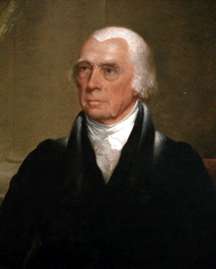Annapolis Convention

After a successful agreement between Virginia and Maryland over trade, and under the prodding of James Madison; Virginia invited the other states to a meeting in Annapolis in September 1786, to discuss the improvement of trade relations. Only five states sent delegates, so an agreement was impossible. The delegates did, however, accept a plan to invite all the states to a conference the following May to draft a constitution to provide suitable powers to the federal government.
The Articles of Confederation had established a weak central government, made up of a Congress with no real executive. While the Congress appointing individuals to handle some executive duties, such as John Jay (Secretary of State) and Robert Morris (Secretary of Treasury); there was no central executive mechanism. To make matters worse, any decision required the approval of all the states. Thus, any one state could veto any proposal. This was particularly problematic when it came to raising revenue, which the Confederation had no means of doing other then requesting money from the states. All attempts to give the Confederation the power to raise money by levying a customs duty came to nothing.
The weakness of the central government also limited the ability of the Confederation to reach satisfactory agreements with foreign governments. American diplomats made trade agreements with a number of European countries, such as France, Sweden and Prussia. Nevertheless, the Confederation was unable to reach any agreements with Great Britain and Spain, two nations with which the US have serious border disagreements. The one major success during the period was the passage of the Northwest Ordinance (1787), which ended the competing state claims for western territory and provided a framework for settling the territory.
Powers of the Confederaton
1) Declaring War
2) Raising an Army and Navy
3) Making Treaties
4) Borrowing Money
5) Establishing a Postal System
6)Conducting Business with Native Americans and other powers
Powers that the Confederation Did Not Have
No authority of individual citizens
No means of enforcing laws
No court system
No ability to tax
Dependent on States to send money
Economic Downturn
With the war over and no strong central government in place the United States suffered from a strong ecnomic downturn. Their were a number of causes of the downturn. The first: A lack of a strong central currency. The Continental Congress had printed paper money to pay for the war. With no gold behind the money and little money being given by the states the paper money became valueless. Individual states began printing money, however it was almost impossible to compare the value of paper money from one state to the other. Finally some states started taxing goods coming into the state from another state. All of this made trade nearly impossible and caused the economy to nearly collapse
In 1784, James Madison set up a meeting at Annapolis in December between Maryland and Virginia (represented by Washington) to discuss the development of the Potomac River as a route to the west. There the states formed a corporation, the Patowmack Company, to improve the waterway and settled disputes over the upper reaches of the river.
Madison succeeded in arranging another conference between the two states in March 1785 at Alexandria, Virginia. Washington encouraged the commissioners, hosting some of the sessions at his plantation, and the "Mount Vernon Compact," signed on 28 March, settled the outstanding issues regarding the use of the Chesapeake Bay and its tributaries. Before departing, the commissioners recommended that yet another meeting with an expanded agenda be called, this time to include representatives from other nearby states. In January 1786, Virginia invited all the states to a special meeting at Annapolis in September to discuss commercial issues.
Madison, who had been a key figure in Virginia's initiative, arrived in Annapolis on 4 September and took up lodging at George Mann's Tavern, which became the site of the Annapolis Convention. He was soon joined by eleven other elected representatives from five states. Their informal discussions preceded the opening session on 11 September, when Delaware's John Dickinson, the elder statesman of the group and author of the Articles of Confederation, was chosen chairman. The delegates agreed that the absence of so many states and the differing instructions given to the delegates would prevent the meeting from accomplishing its stated purpose. But the strong nationalism of the dozen men, seven of whom had served under arms during the Revolution, led them to decide to use the opportunity to express their views in a report to the individual state legislatures and Congress.
———
Virtually everyone agreed that the question of trade regulation could not be divorced from larger political issues, an area that the delegates had no authority to discuss. One delegate, apparently Abraham Clark of New Jersey, therefore suggested that the report recommend another meeting explicitly empowered to frame measures to strengthen the Articles. When the others agreed, Alexander Hamilton prepared a draft with the assistance of Madison and Edmund Jennings Randolph. The full convention then polished the text before adjourning on the afternoon of the 14th. Each delegation carried a copy of the report back to its own legislature, while Dickinson delivered a copy to Congress. On 21 February that body endorsed the call for a convention to meet in Philadelphia on the second Monday in May of 1787—the convention that would write the Constitution.
On 19 September 1786 the Maryland Journal printed the first public notice about the Annapolis Convention. Its author commented, "Should this Address have its Effect, we may hope to see the Federal Union of these States established upon Principles, which will secure the Dignity, Harmony and Felicity of these confederated Republics; and not only rescue them from their present Difficulties, but from that insolent Hauteur and contemptuous Neglect, which they have experienced as a Nation."
 >
>